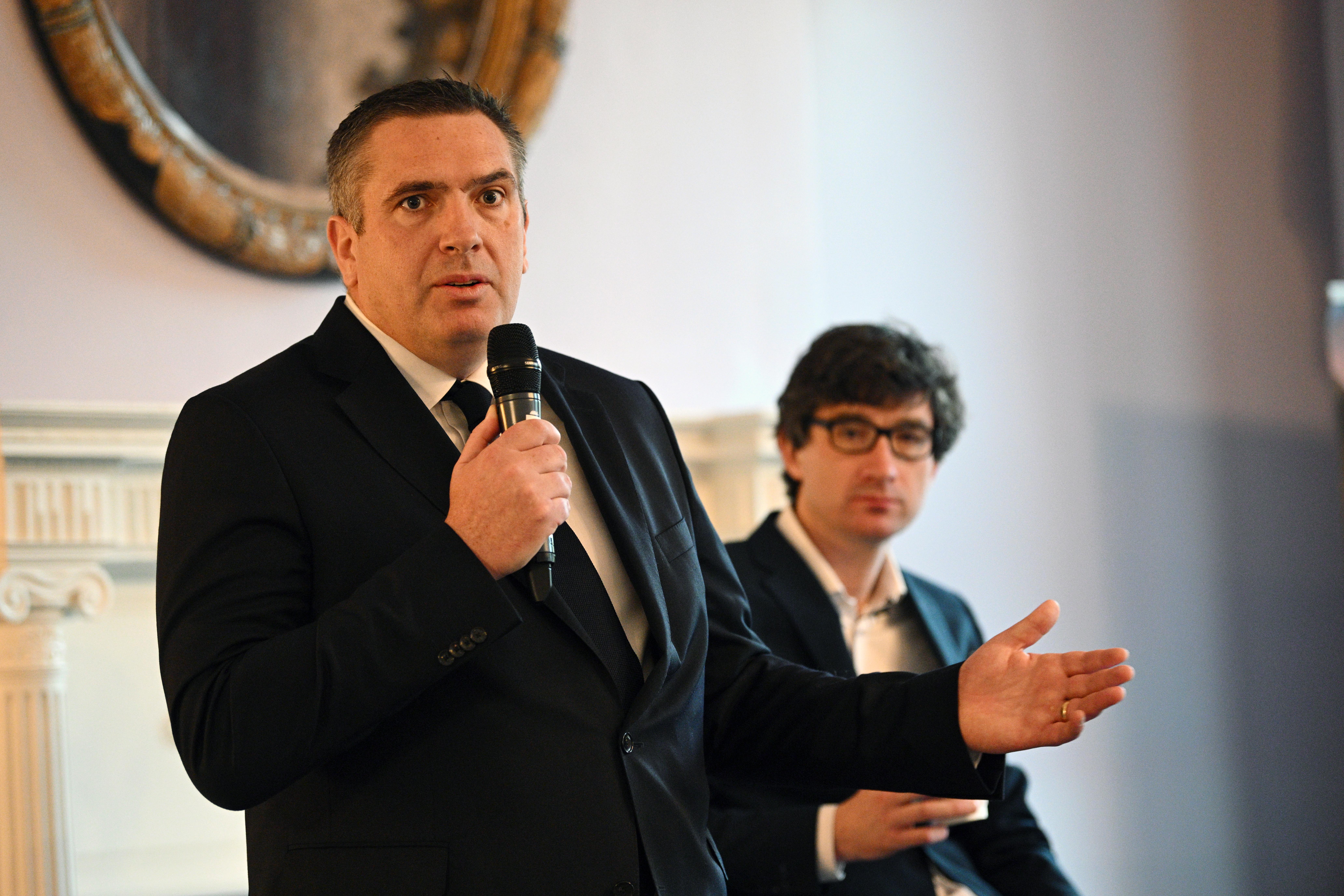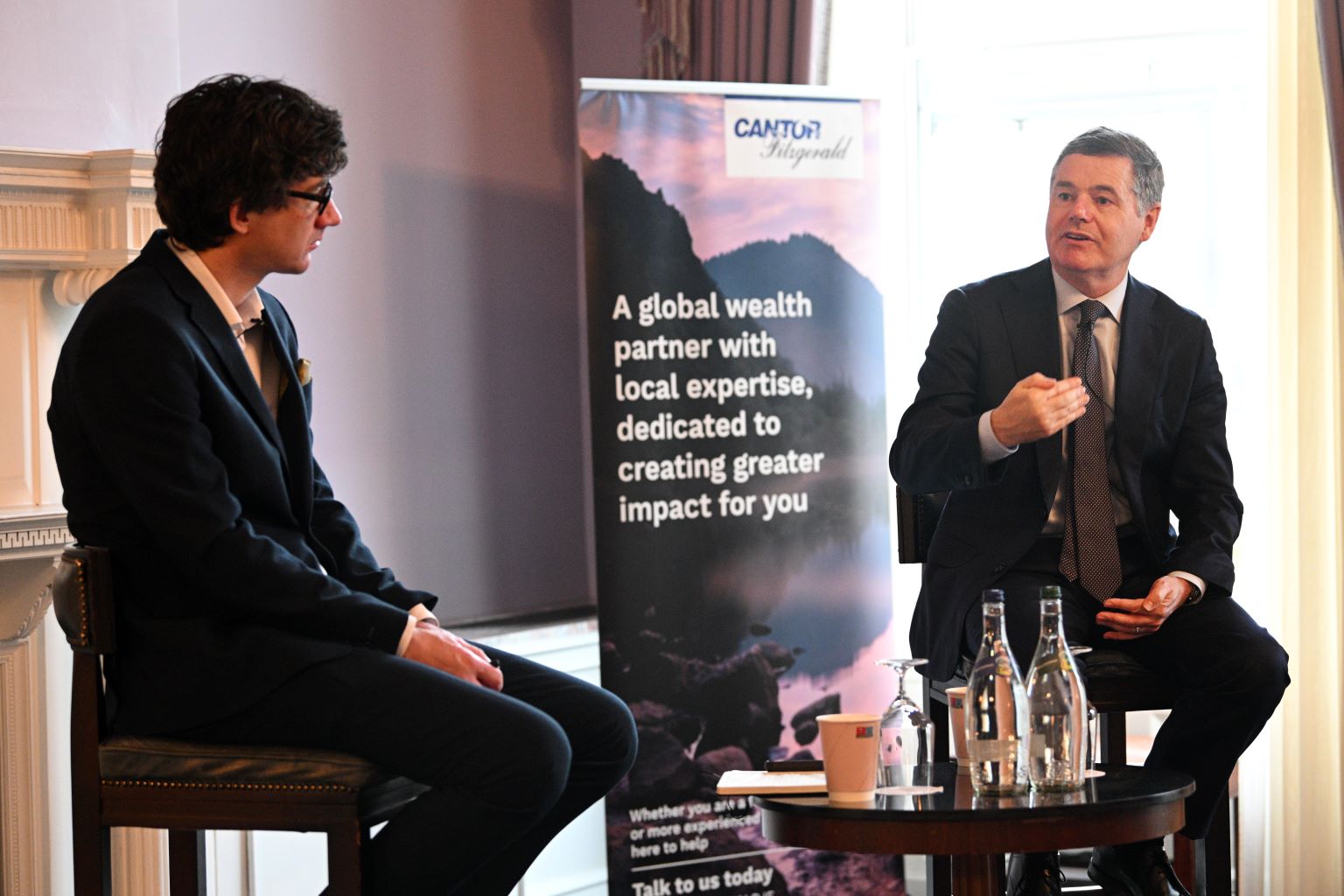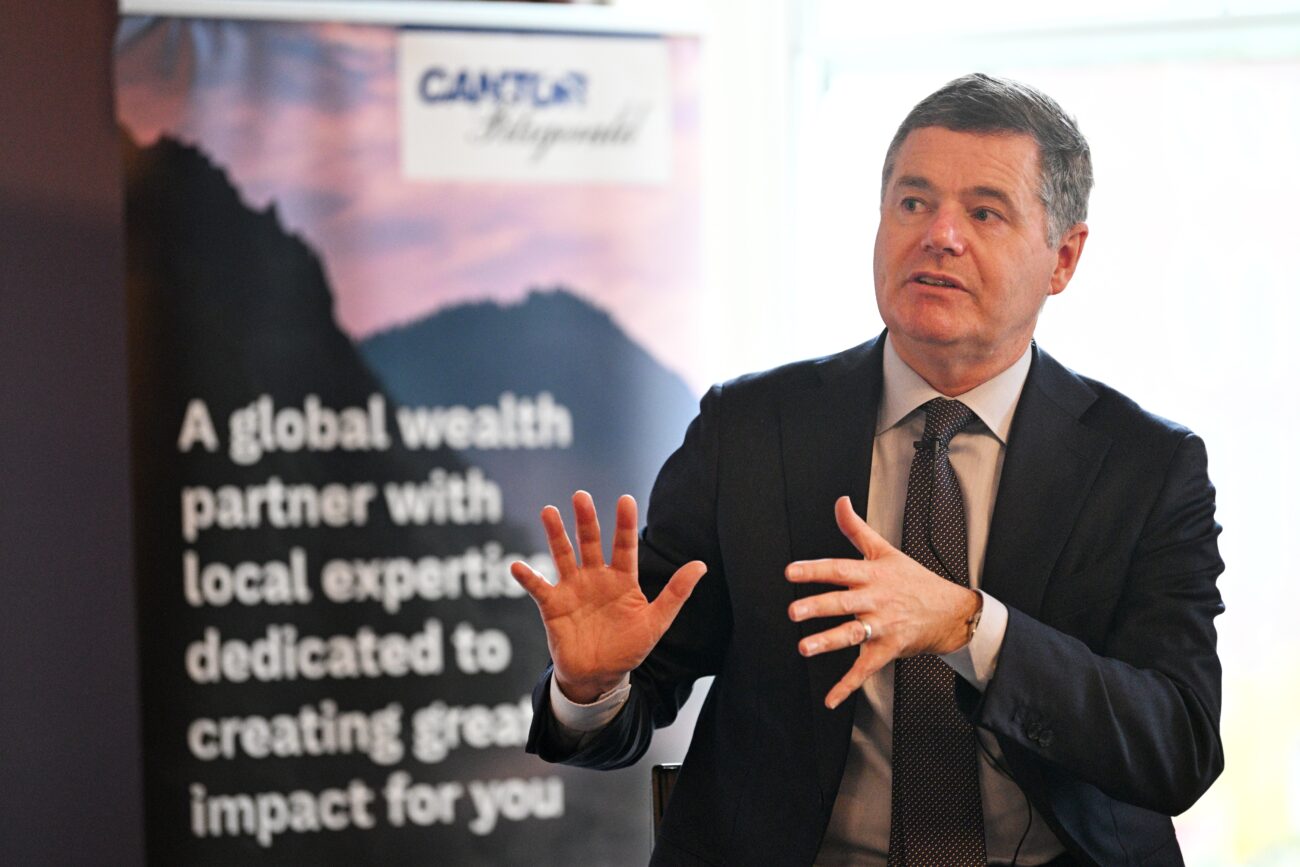Two weeks have passed since Paschal Donohoe took to his feet on Budget Day, and the Minister for Public Expenditure and Reform is sitting before 150 people in the Shelbourne Hotel in Dublin.
The €10.5 billion budgetary package was broadly welcomed, albeit not by the hospitality sector, who protested outside Leinster House the day before over the government’s decision not to reduce Vat for the sector.
Already, the the political world has moved on — the multiple controversies surrounding the main opposition party Sinn Féin have led to feverish rumours of an imminent election announcement.
However, speaking to a room full of investors and business people at an event organised by Cantor Fitzgerald in partnership with The Currency, the minister was quick to stick to the party line on the election date.
“It is dependent on the Government completing its work, and we have some more work to do,” he said.

Even when Sinn Féin was riding high in the polls, Donohoe argued that it was not inevitable that the party would lead the next government.
His view has only been fortified by Sinn Féin’s slump in the polls and its ongoing turmoil over party resignations.
“Nothing is certain in politics, and a moment of reconsideration always happens in advance of an election,” Donohoe said.
“Even before that moment of reconsideration happened, even before the recent weeks’ events, the combined parties in government, even on their more difficult days, have been polling between 40 and 45 per cent consistently. For all kinds of different reasons, maybe that was not always in focus. But a combination of our new leader Simon Harris and the political difficulties the main opposition party are facing are undoubtedly accelerating that moment of reconsideration, and we’ll get to a point when the work of Government is done that will take our work to the people.”
Donohoe also reflected upon the correlation between his own party’s surge in support and the buoyancy of the economy, pointing to the work of Simon Johnson, James A Robinson, and Daron Acemoglu, the three economists who have just won the Nobel Prize for economics.
“They were heralded for their work in correlating and looking at the causal link between the health of democratic political institutions and economic prosperity. And they were looking at what is the relationship between how politics is organised and how economics operates.
“If you look at where we are economically at the moment, I’ll simply say that I believe the appreciation in our society and amongst the elecorate for economic and even political stability has grown as the world has changed. I believe that is the background music to what is now happening within our politics at the moment,” he said.
In a candid question-and-answer session at the Cantor Fitzgerald event, Donohoe answered questions on a range of topics, including:
- Criticism of the recent budget “giveaway”, and the Fiscal Advisory Council’s warning of repeating past fiscal mistakes
- The concerns of the hospitality sector, and the rise in the cost of business
- FDI, complacency and competitiveness
- Transforming Ireland into a net energy exporter
- What the UK’s new FDI policies mean for Ireland
- The Dublin Airport Cap
- Bike sheds, the National Children’s Hospital and capital spending
- What Trump’s trade policies would mean for Ireland
- The European economic outlook
Donohoe on criticism of recent budget “giveaway”
“Last year, we ran a budget surplus of €8.6 billion. This year we’ll run a bigger one. I’m not an economist, but I understand economics. I’m a politician, and I have to make the argument for this in an environment of growing and, at times, inconsistent demands. That’s the nature of being in government. And I’ll simply say that there are many, many other governments, which, in the face of a €24 billion euro surplus two weeks before the budget, would have made very different choices. And I have little doubt at all that if we had not put in place the cost of living measures, the critique that I would have faced for the last two weeks is, why are you deliberately making the country poorer, given that you had the money to offset the impact of inflation?
“We have brought additional expenditure into our economy over the last two years, inflation has declined in line with what has happened in the euro area. Is there an inflation risk when you spend more? Yes, and we have estimated what that inflation risk could be.
“But there are also risks of not spending more, and you underestimate at your political peril the impact of living standards having declined by a fifth in just over two years. That is a risk that a politician of the centre has to be very much aware of. Everywhere I go, I carry my ballot paper from the last election in my wallet. I’m the one who will go around door to door, looking for support for what I’ve done.
“I’m a politician who understands economics, but I’m a politician who’s not interested in just making an argument. I’m interested in winning the argument. That’s what I’m here to do. I’m going to make that argument for budget surpluses in the next election, and I’d definitely believe there’ll be no politician in the opposition doing it, and there’ll be few politicians making the case for it in the way I have in recent years, and will do so again.”
On criticism by the hospitality sector, and the rise in the cost of business
“We certainly need to have a consideration of what are the issues that are making it harder for small and medium-sized businesses. And I do accept that point. Decisions have been taken, which all individually are welcomed, but in the round are posing the challenge. That is a critique that I’m aware of, and it’s one that we will need to address in the time that is ahead of us.
“I do offer the gentlest of pushbacks here today — I would just warn of the risk of keeping on breaking the budget down into what’s in it for each individual sector. While that is, of course, an approach that any particular sector will take, and it’s also an approach that every government department will take because they’re trying to maximize the resources for their own department, let’s just not lose sight of the broader picture and the impact that five budgets have now made to where our country stands. Most notably the fact that we have 400,000 more people working in our economy than we did before 2020 and those 400,000 people are all working in jobs that didn’t exist four years ago. That, by any measure, would not be happening if small and medium-sized businesses weren’t supported within our economy.”
On FDI, complacency and competitiveness
“I don’t accept the complacency is there, but I accept the critique that is being made on a number of these different issues, while I don’t agree with them in their entirety, because I would look at each in turn and be able to point to policy trade-offs and some of the difficulties that are there. I’m aware of two things that are happening at the moment.
“Firstly, there’s a powerful debate underway in Europe regarding our competitiveness on the world stage, and then an acknowledgement that if we keep on going in the direction that we are, we will be a weakened Europe, and we will be a Europe in which our living standards are declining.
“And within that, there is a deeply compelling challenge we have to rise to here in Ireland that what it means to be competitive in the decades ahead is different to what it meant to be competitive in the decades that have just gone by. Whether it be the passenger cap, whether it be data centres, I see really important policy issues there that we do need to rise to.
“As we look at it, sector by sector by sector again, we shouldn’t lose sight of what the very, very big picture is here. The very big picture for me, is of an open, confident Irish economy and society adding on to the current pillars of economic prosperity, with two more. The case for openness as economic advantage, and Ireland being at the middle of the energy transition for Europe. By doing that, repositioning where we sit in Europe, and developing a new pillar of economic growth for our country that we haven’t had before, that is ensuring that we are an exporter of energy to the rest of the world, and that energy being green.”
On turning Ireland into a net energy exporter
“No competitive model stays unchanged, because if you think you’re standing still, you move backwards. And the symbiosis that I see developing is our FDI community at the moment is actually in the lead in making the case for needing new forms of energy that are greener and more sustainable.
“I see our ability to meet that need also being part of how we will develop a new economy in Ireland that will be domestically led, which will be how we develop that energy through renewable sources. And that delivery happening in a way that also delivers against balanced regional development in a way we’ve never been able to do before. And I think it’s as big an opportunity for this century as FDI was for the last. I see it in that scale, and that is what we have to devote ourselves to now do.”
On what the UK’s new FDI policies mean for Ireland
“We are a competitive, agile economy. At many different points, the question has been asked that a country or somebody else is looking to challenge where we are. We are friends. We are neighbours with the United Kingdom. We, however, have a number of points of difference to them.
“We’re in the single market, we’re in the European Union, we’re in the euro, and we have budgetary flexibility from a number of sources that we’re about to use. I very much welcome and want to see the UK on a path to prosperity that their people deserve. And I wish them all their success in doing that. I’m equally confident that we will be able to look after ourselves and take the decisions that we need to secure our own prosperity.”
On the Dublin Airport cap
“I’m extremely critical of how we’ve got to this point and how this has happened. And I’ll simply say, because all this has to be worked out inside government as well, that I want our aviation policy to be a contributor to economic growth. That’s been my view when I was minister for transport.
“While there are going to be constraints on any airport for a number of different reasons, if Dublin Airport’s success is constrained at a certain level, the spillover effects for our national reputation and our economy are not acceptable. So we will have work that we need to do in relation to that.”
On bike sheds, the National Children’s Hospital, and capital spending
“Go into a new school building that’s a primary or secondary school building anywhere in the country and compare that to the primary school and secondary school buildings that all of us were in. Any of you who are now participating in the National Broadband Plan ahead of time and under budget. If any of you live in a community that has now been influenced by the roll-out of a flood relief scheme that’s delivered by the OPW.
“They are all very powerful examples of public money being used in a way that we want and that is in line with the country’s expectations. And what I find very frustrating about the issue of the bike shed in particular, is that it undermines the public confidence in the ability to make those arguments.

“But for any of you here who begin your day dropping your kid to a new school, have a look at that building and compare that to the building that went before it. In relation to the Children’s Hospital, I could make the argument that it’s the first time that Ireland has built a hospital of that scale in many decades. But in addition to making that argument, I’ll acknowledge all the mistakes that were made, and point to the fact that in learning those mistakes, it’s the reason why we are costing projects like the National Broadband Plan and the Metro in an entirely different way to how we’ve done it before.
“So I find that element of it, and the challenges in relation to the bike shed in particular, frustrating because it undermines the ability to make the case for other things. If we are making the case for more public investment in the future, losing sight of how lots of public investment is well done will, over time, delegitimise the argument for investing more.”
On what Trump’s trade policies would mean for Ireland
“This is why we have to run budget surpluses — to be aware of big changes that could happen in global trade and global tax policy, and it underlines the really important point about the dangers of complacency. I am ever aware of the risk of hubris. I’m always aware of the need for humility, because of how quickly things can change in the global economy.
“One of the further reasons for the agenda of investing in our infrastructure, maintaining focus on competitiveness and being aware of the competitive benefits of being inside the single market is other decisions that other countries could take — whether that be America or elsewhere, it is our great, great challenge. But it is also an opportunity, and that’s what this Government will have to deal with in the rest of its term, and it’s certainly what the next government will have to confront.”
On the European economic outlook
“Despite having a major war taking place on its borders, and despite the fact that we have gone through an inflation surge and the after-effects of a pandemic, Europe has handled those crises in a way that’s completely different to how our critics would have expected, and is far better than we have handled other equivalent economic challenges, though we’ve never had a war in our recent history. The challenge about where we stand at the moment is we don’t have the luxury of comparing our performance on our own terms. We always have to deal with it.
“Each year, the IMF publishes the World Economic Outlook. They do it every April. And if you look at the table that looks at Europe’s medium- to long-term growth potential, and you compare it to the Gulf, you compare it to China, and you compare it to America, even though our medium-term growth performance doesn’t compare too badly to where we have been historically, in future terms, we are behind the rest of the world. That’s the issue. It’s an issue of relative performance.
“There we have really big opportunities we need to rise to that have been outlined in a number of different reports, and it’s something now that finance ministers are trying to move forward. So that’s the big challenge that we now face. I remember being a member of the Eurogroup when the pandemic hit, and I remember reading lots of forecasts that the Euro was going to come apart, that we were going to move into a depression, but that didn’t happen.
“I remember when the war began in Ukraine, and I remember when we were looking at the forecast for the energy transition that Europe would need to make, and many predicted we wouldn’t be able to do it, and that we were going to move into a recession. We have avoided a recession. Our economies have continued to grow. But the challenge is, we don’t have the luxury of looking at that on our own terms. We have to compare what’s happening in the rest of the world. And that’s where our challenge is now.”


